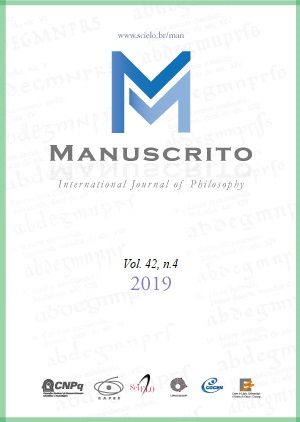Abstract
In this paper I examine how Aristotle thinks syllogisms establish existence. I argue against the traditional "Instantiation" reading and in favor of an alternative "causal" or "structural" account of existential syllogisms. On my interpretation, syllogisms establish the existence of kinds by revealing that they are per se unities whose features are causally underwritten by a single cause/essence. They do so by tracing correlations between propria--peculiar, coextensive features--of the kind in question.
References
ANGIONI, L. “Causality and Coextensiveness in Posterior Analytics I.13,” Oxford Studies in Ancient Philosophy LIV, pp. 159-85, 2018.
BARNES, J. Aristotle: Posterior Analytics. Second Edition. Oxford: Oxford University Press, 1993.
BAYER, G. “Definition through Demonstration: The Two Types of Syllogisms in Posterior Analytics II.8,” Phronesis XL, pp. 241-64, 1995.
BOLTON, R. “Definitions in the Posterior Analytics and Generation of Animals,” in A. Gotthelf and J.G. Lennox (eds.), Philosophical Issues in Aristotle’s Biology, Cambridge: Cambridge University Press, pp. 120-66, 1987.
BRONSTEIN, D. Aristotle on Knowledge and Learning: The Posterior Analytics, Oxford: Oxford University Press, 2016.
CHARLES, D. Aristotle on Meaning and Essence, Oxford: Oxford University Press, 2000.
DEMOSS, D. and D. DEVEREUX “Essence, Existence, and Nominal Definition in Aristotle’s Posterior Analytics II.8,” Phronesis XXXIII, pp. 133-54, 1988.
GOLDIN, O. Explaining an Eclipse: Aristotle’s Posterior Analytics 2.1-10, Ann Arbor: The University of Michigan Press, 1996.
GOMEZ-LOBO, A. “The Ergon Argument,” Phronesis XXXIV, pp. 170-85, 1989.
HASPER, P. “Sources of Delusion in Analytica Posteriora I.5,” Phronesis LI, pp. 252-84, 2006.
INWOOD, B. “A Note on Commensurate Universals in the Posterior Analytics,” Phronesis XXIV, pp. 320-29, 1979.
KARBOWSKI,J. Aristotle’s Method in Ethics: Philosophy in Practice, Cambridge: Cambridge University Press, 2019.
LENNOX, J.G. “Divide and Explain: The Posterior Analytics in Practice,” in A. Gotthelf and J.G. Lennox (eds.), Philosophical Issues in Aristotle’s Biology, Cambridge: Cambridge University Press, pp. 90-119, 1987.
LENNOX, J.G. “Getting a Science Going: Aristotle on Entry Level Kinds,” in G. Wolters and M. Carrier (eds.), Homo Sapiens and Homo Faber, Berlin: DeGruyter, pp. 87-100, 2005.
LENNOX, J.G. “Preparing for Demonstration: Aristotle on Problems,” Metascience XXIII, pp. 1-35, 2014.
MCKIRAHAN, R. Principles and Proofs: Aristotle’s Theory of Demonstrative Science, Princeton: Princeton University Press, 1992.
OWEN, G.E.L. “Aristotle on the Snares of Ontology,” in R. Bambrough (ed). New Essays on Plato and Aristotle, London: Routledge and Keegan Paul, pp. 69-95, 1965.
PELLEGRIN, P. Seconds Analytiques, Paris: Flammarion, 2005.
ROSS, W.D. Aristotle’s Prior And Posterior Analytics, Oxford: Oxford University Press, 1949.
UPTON, T.V. “The ‘if-it-is’ question in Aristotle,” Ancient Philosophy XI, pp. 315-30, 1991.
ZUPPOLINI, B. “Explanation and Essence in Posterior Analytics II 16-17,” Archai: Revista de Estudos Sobre as Origens Do Pensamento Ocidental XXIV, pp.229-64, 2018.


